Overview
This article shines a light on various engaging activities designed to help children with autism develop essential social skills. It emphasizes the effectiveness of strategies such as:
- Emotion Charades
- Board games
- Role-playing scenarios
- Technology-assisted applications
These approaches not only promote interpersonal development but also nurture communication, emotional recognition, and teamwork among participants. As parents, understanding these strategies can be a vital step in supporting your child's growth and fostering meaningful connections.
Introduction
In a world where social skills are essential for both personal and professional success, children with autism encounter distinct challenges as they navigate social interactions. Thankfully, innovative approaches such as:
- community gardening
- role-playing scenarios
- engaging games like Emotion Charades
present promising pathways for development. This article delves into a variety of effective strategies and tools crafted to enhance social skills in children with autism, underscoring the vital role of community support, interactive learning, and tailored interventions. By exploring recent research and practical applications, it highlights how these methods not only nurture essential skills but also cultivate a sense of belonging and confidence among young learners.
About ASD Media: Empowering Social Skills Development for Autism
ASD Media is dedicated to enhancing the implementation of ABA therapy by offering valuable insights and strategies that tackle challenges and improve outcomes. Their mission revolves around empowering parents and professionals to unlock the potential of youth with autism and ADHD. By providing a wealth of resources and support, ASD Media fosters a vibrant community where individuals can share experiences and learn from one another. This cooperative environment is particularly crucial for developing interpersonal abilities through social skills activities for autism, which significantly impact the lives of children on the autism spectrum.
Research indicates that early intervention, such as introducing augmentative and alternative communication by 12 months, greatly enhances communication skills—essential for effective interpersonal development. Through their initiatives, ASD Media not only champions effective ABA therapy practices but also underscores the transformative power of community support in nurturing social skills activities for autism development.
Moreover, ASD Media acknowledges the necessity of practical advice for parents, exemplified in the case study titled 'A Beginner's Guide to Autism Potty Training Success,' which offers strategies for navigating developmental milestones. The apricoott team notes that 'ABA therapy can be a fulfilling profession for individuals who appreciate engaging with youth and creating a positive influence on their lives,' highlighting the professional commitment to this field.
As we look toward 2025, the evolving trends in ABA therapy for autism emphasize the need for comprehensive support systems. ASD Media remains devoted to showcasing successful community projects that promote social skills activities for autism, ensuring families have access to the resources they need.
Emotion Charades: A Fun Game to Enhance Emotional Recognition
Emotion Charades is a delightful game that invites children to express various emotions through acting, while their friends guess what they are portraying. This interactive experience not only makes learning fun but also significantly boosts emotional recognition skills. By using visual cues and expressive body language, children learn to identify and articulate their feelings, a crucial step in nurturing empathy and social awareness.
Recent research, including a study by Huang in 2023 with four participants aged 4 to 5, underscores the effectiveness of games like Emotion Charades in enhancing emotional intelligence among children with autism. The findings reveal that such activities can lead to remarkable improvements in emotional recognition abilities. Experts in youth psychology emphasize the importance of games in developing empathy, as they encourage children to step into others' shoes and understand diverse emotional experiences.
The application of Emotion Charades in autism treatment has shown promising results, with many therapists reporting enhanced emotional skills in their clients. Specific case studies focusing on social skills activities for autism, particularly the use of charades for emotional recognition in children, demonstrate that this approach not only aids in skill development but also fosters a sense of community and teamwork among participants. The structured nature of the game allows for continuous practice, reinforcing positive educational outcomes.
Data indicates that engaging in charades can lead to significant advancements in emotional recognition among youth, making it a valuable tool in therapeutic settings. This careful selection process ensures that the review is grounded in relevant and high-quality studies, bolstering the credibility of the conclusions regarding the effectiveness of serious games in developing interpersonal skills.
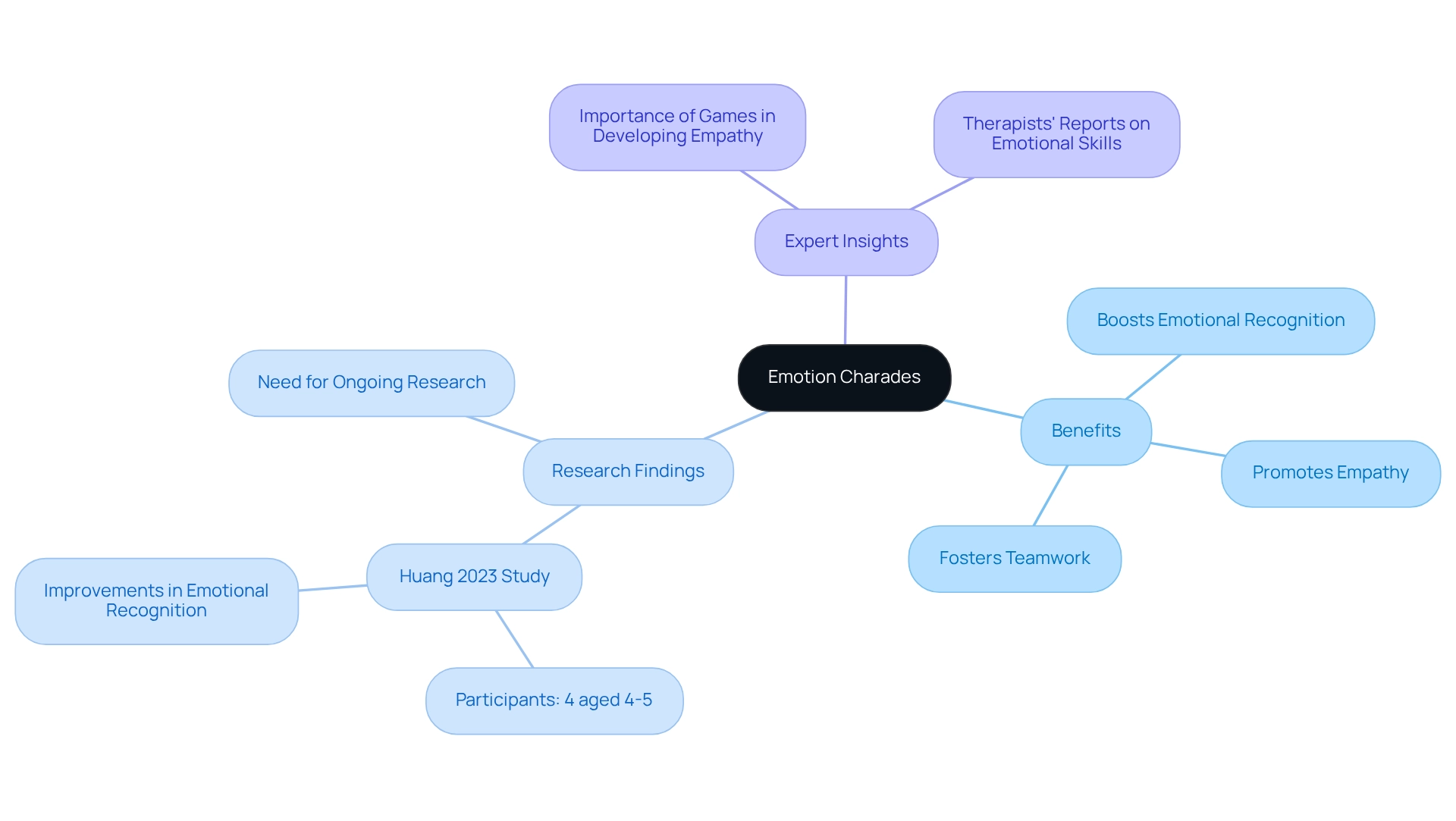
Board Games: Encouraging Interaction and Turn-Taking Skills
Board games can serve as excellent social skills activities for autism, fostering interaction among children. Games like 'Candy Land' and 'Connect Four' not only require players to wait for their turn, but also encourage meaningful conversations, enhancing interpersonal skills. Recent research highlights the importance of these activities in helping children grasp the nuances of interactive play, promoting collaboration and patience.
In fact, a study examining behaviors in both collaborative and competitive settings reveals that board games can significantly support the development of interpersonal skills. Additionally, statistics show that challenges in Executive Functioning—skills like planning, organization, and attention—can be addressed through these engaging activities.
Teachers have noted that collaborative board games create a nurturing environment, particularly in preschool settings, where learning to take turns is crucial for social growth. The Selçuklu Cognitive Education Program has demonstrated impressive improvements in children’s cognitive and interpersonal skills, underscoring the effectiveness of structured play in therapeutic contexts.
As Bengü Türkoğlu stated, "In conclusion, EBGTP, which was given to 40 fourth graders in primary school, was found to have a considerably positive impact on the interpersonal development of youngsters." As young individuals navigate the rules and dynamics of board games, they cultivate essential skills that enhance their overall interpersonal competence. This makes social skills activities for autism vital for fostering relationship-building in autism therapy. Consider incorporating board games into your child's routine to support their social development and create joyful moments together.
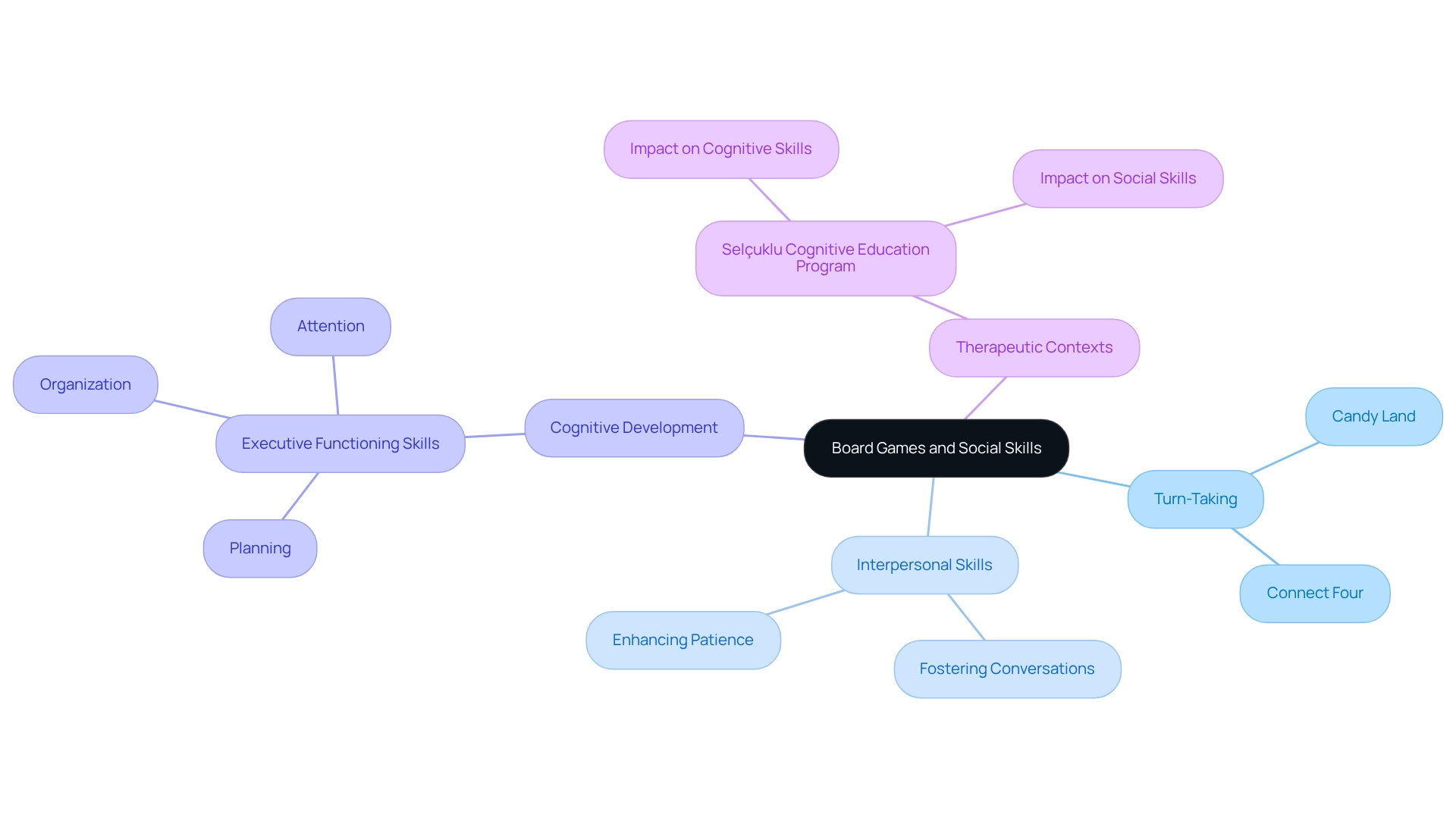
Role-Playing Scenarios: Practicing Real-Life Social Interactions
Role-playing scenarios are essential social skills activities for autism that help children with autism navigate various interactions, such as greeting peers or ordering food at a restaurant. Participating in social skills activities for autism enables young individuals to practice appropriate reactions and behaviors, fostering confidence and enhancing their interpersonal skills. Research indicates that recording these role-plays enables children to visually review their interactions, significantly boosting self-awareness and understanding of social exchanges. Moreover, integrating sensory-based activities into role-playing heightens engagement, making the learning experience even more impactful.
A blended approach that combines both online and in-person role-playing formats caters to individual comfort levels and preferences, offering distinct benefits and challenges. For instance, online formats may provide a more relaxed environment for some children, while face-to-face sessions can enhance real-world interaction skills. This flexibility can lead to a more holistic development experience in social skills activities for autism training. As Ruben Kesherim wisely observes, "By integrating role-playing into interpersonal skills training, parents can assist their offspring in developing the communication and interaction abilities essential to succeed in various situations." Through practicing these scenarios, young individuals become adept at handling everyday interpersonal situations, paving the way for richer interactions and deeper relationships.
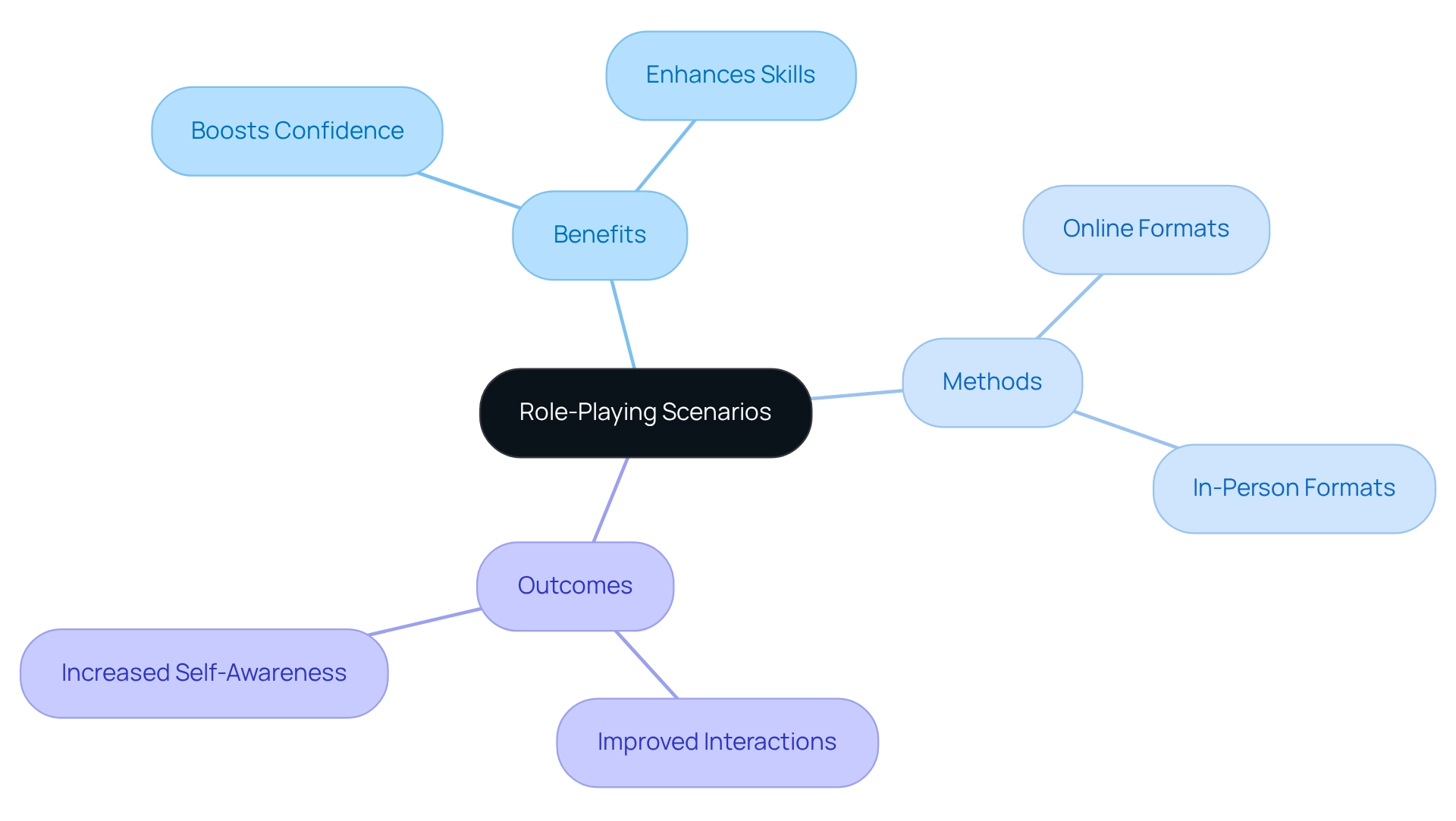
Social Stories: Guiding Children Through Social Situations
Tailored narratives serve as a powerful tool to illustrate interpersonal situations and the expected behaviors within them. These stories can address a variety of scenarios, such as making friends or resolving conflicts. By engaging with these narratives, young individuals gain valuable insights into handling interpersonal exchanges more effectively. This method is especially beneficial for children with autism, as it simplifies complex cues into manageable segments through social skills activities for autism.
Recent research underscores the significant impact of narrative techniques on communication abilities in children with autism. For instance, a study released in 2023 revealed that 75% of teachers observed enhanced interactions among students after incorporating narratives into their classrooms. Additionally, the Picture Exchange Communication System (PECS) complements these narrative stories, further enhancing communication by allowing individuals to express their needs more clearly.
Experts highlight the transformative power of narratives in teaching interpersonal skills. Dr. Carol Gray, the creator of Social Stories, emphasizes their effectiveness, stating, "The beauty of Social Stories lies in their ability to assist young individuals in understanding and adapting their behavior and emotions in different interpersonal situations." This approach not only aids in grasping societal norms but also empowers youngsters to navigate interpersonal situations with greater confidence.
As we look ahead to 2025, the use of narrative techniques continues to evolve, with practitioners increasingly recognizing their role in autism therapy. Successful case studies illustrate that young individuals who participate in social skills activities for autism, such as engaging with social stories, demonstrate marked improvements in their ability to interpret social cues and respond appropriately, ultimately fostering their social skills development. This information remains relevant, as the article was originally published on March 1, 2018. We encourage parents and caregivers to explore these resources and share their experiences, as together we can support our children’s growth and understanding.
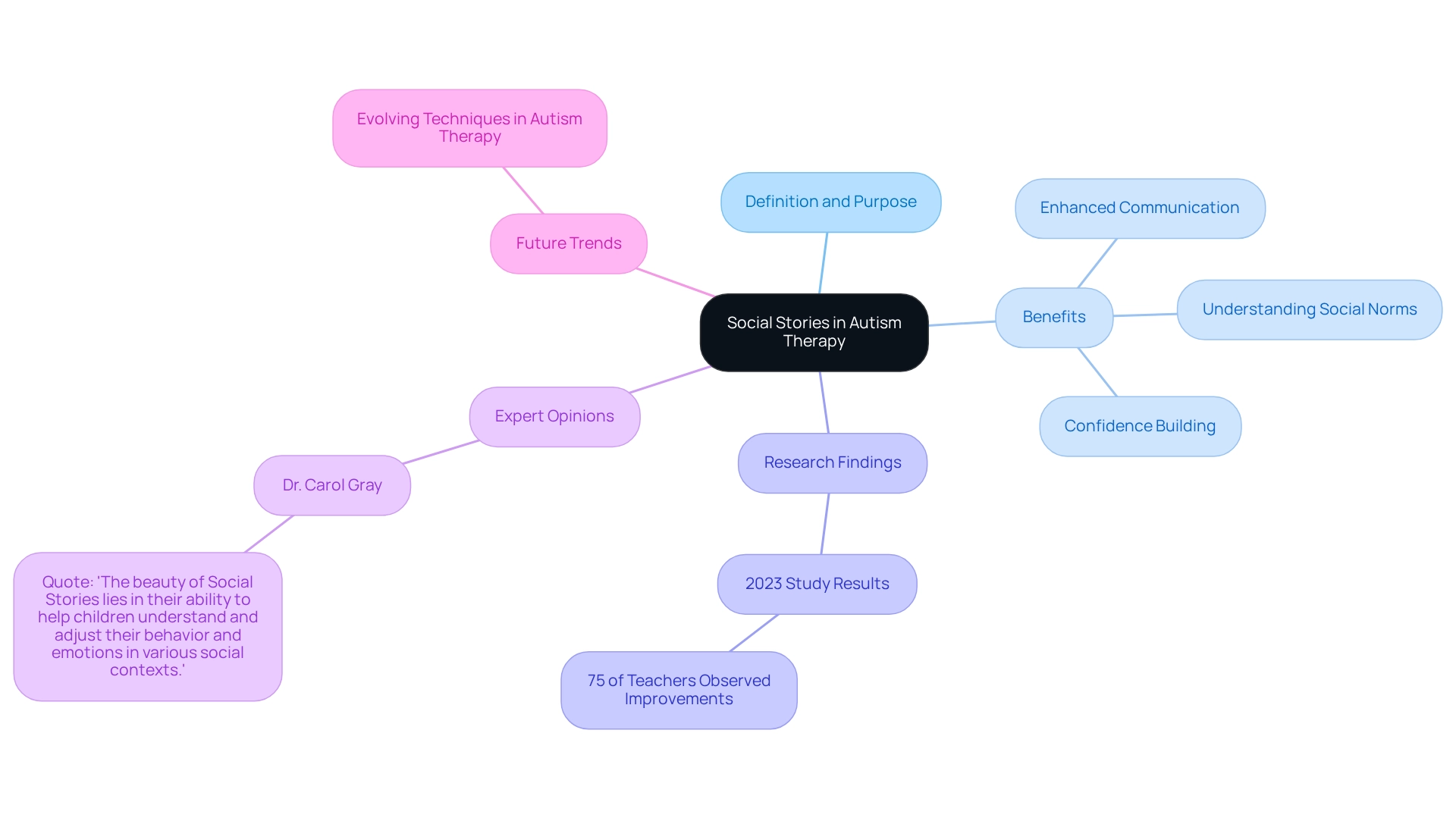
Hula Hoop Boundaries: Teaching Personal Space Awareness
The Hula Hoop Boundaries activity serves as a valuable resource for educating young individuals about the importance of personal space. In this engaging exercise, each participant stands inside their own hula hoop, which visually represents their personal space. As they navigate their surroundings, they learn to respect the boundaries of others, fostering an understanding of interpersonal dynamics and the significance of comfort levels in interactions. This activity not only enhances awareness of personal boundaries but also encourages youngsters to be mindful of their surroundings, nurturing respectful and empathetic interactions with peers.
Recent studies highlight the essential role of personal boundaries in developing interpersonal skills. Youth who grasp these concepts are often better equipped to manage their interactions. For instance, a study involving 32 participants contributes to the broader understanding of interpersonal dynamics in youth with developmental differences, underscoring the importance of personal space awareness. As psychologist Scott Bellini observes, "However, if the young person is monitoring his own behavior, he can assess it," emphasizing the significance of self-awareness in interpersonal interactions.
By incorporating social skills activities for autism into therapy programs, caregivers and professionals can significantly enhance interpersonal abilities and overall interactions for youth with autism. Additionally, the case study titled 'Future Directions for Research on Personal Space in ASD' calls for further exploration of personal space regulation, reinforcing the need for effective interventions like the Hula Hoop Boundaries activity. This approach not only supports the development of vital skills but also fosters a nurturing environment for all young individuals.
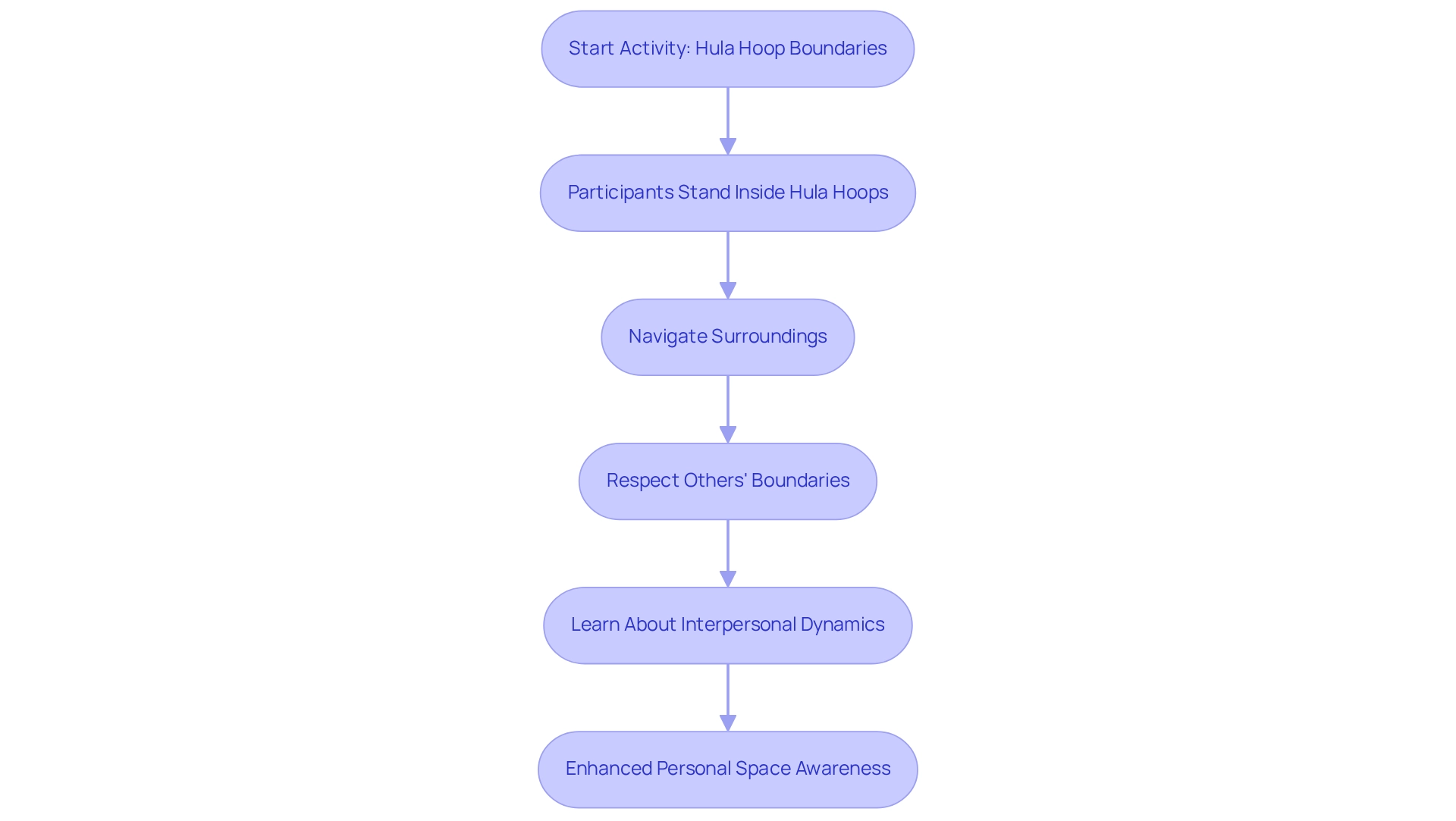
Community Gardening: Fostering Teamwork and Social Interaction
Community gardening serves as a nurturing space where young people can come together to plant and care for a garden, fostering their interpersonal skills in a meaningful way. This enriching activity encourages collaboration, as young individuals learn to communicate effectively and work together towards shared goals. Through the act of gardening, they discover the importance of sharing responsibilities, celebrating collective successes, and learning valuable lessons from one another, all within a supportive environment.
Recent research highlights the positive impact of community gardening on children's social connections. Participants report stronger community bonds and greater levels of civic involvement compared to their non-gardening peers. For instance, Soga et al. (2017) found that gardeners had mean community cohesion scores 1.57 points higher than those who do not garden. Furthermore, case studies like 'Community Gardens and Neighborhood Cohesion' illustrate successful gardening projects that not only foster collaboration but also strengthen neighborhood ties, showcasing the profound effects these initiatives have on communal capital.
Educators have observed that these collaborative experiences are vital in nurturing essential interpersonal abilities. As such, community gardening emerges as a significant resource for social skills activities for autism therapy today. By participating in social skills activities for autism, young people not only cultivate gardens but also grow their connections with one another and their communities. If you're a parent or educator, consider exploring local community gardening opportunities that can enrich the lives of the children you support.
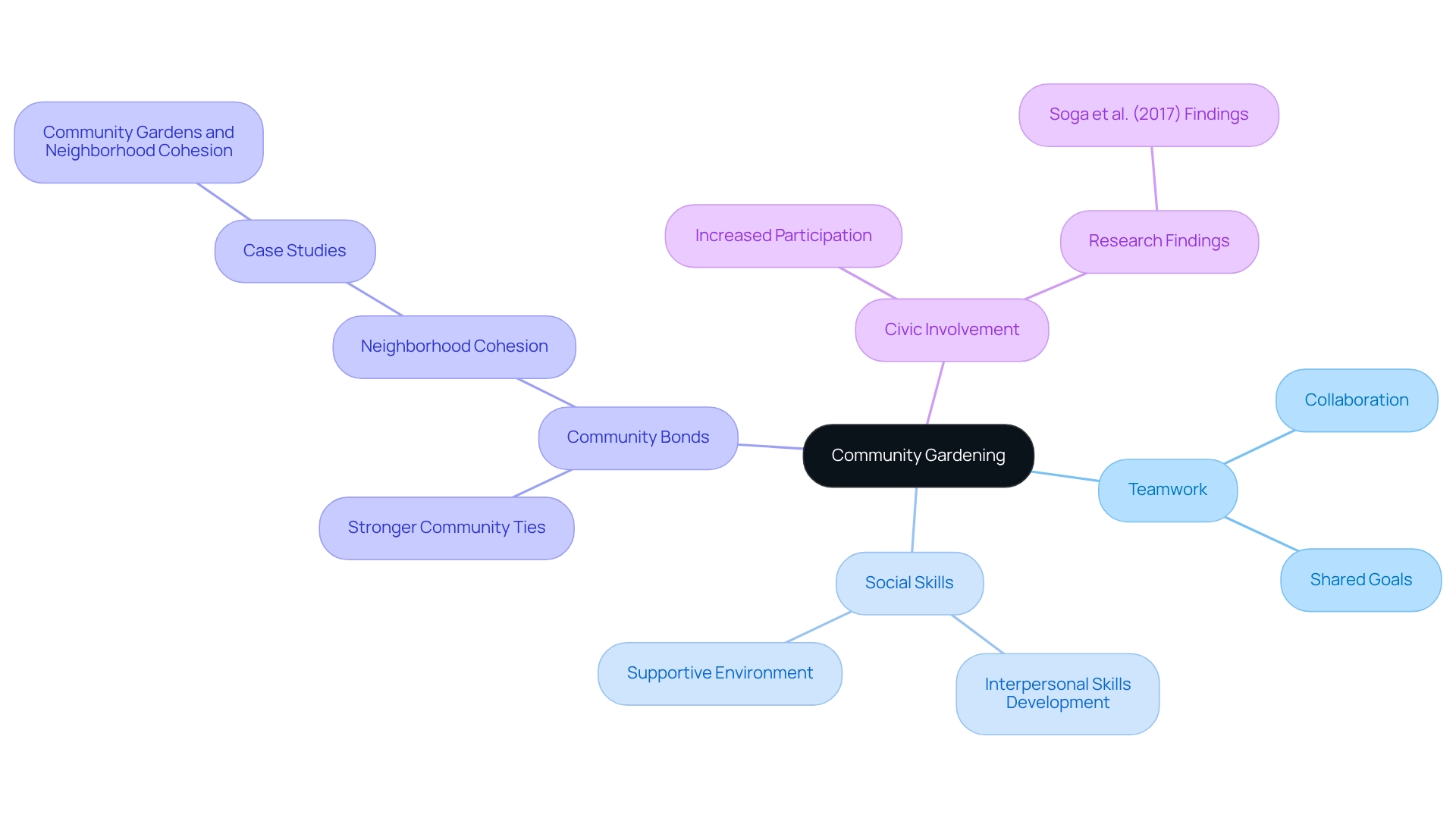
Improv Stories: Boosting Creativity and Conversational Skills
Improv stories offer a wonderful opportunity for young ones to craft spontaneous narratives based on prompts, nurturing their creativity while also enhancing their conversational skills in a supportive environment. This engaging activity not only promotes self-expression but also fosters active listening and adaptability—essential elements of effective communication.
Recent research reveals that participation in improv significantly boosts socialization, with 76% of participants noting improved interactions. Moreover, over half of the participants expressed greater appreciation for others when they felt confident in their scene partner, highlighting the importance of trust in the connections formed through social skills activities for autism, suggesting that improv can serve as a valuable tool for socialization and community building.
Research indicates that children involved in improvisation activities develop the ability to think quickly and respond effectively, mirroring real-life conversational scenarios. As young individuals engage in these creative stories, they develop confidence and a sense of belonging, both of which are essential for improving their overall social skills, particularly through social skills activities for autism.
Creswell notes that the study aligns with the key characteristics of qualitative research, taking place in a natural setting, which further attests to the effectiveness of these activities. Additionally, the dual role of the teacher educator as both an improviser and a teacher underscores the significance of skilled facilitation in achieving positive learning outcomes.
As parents, consider exploring these enriching activities for your children, fostering their growth and connection with others.
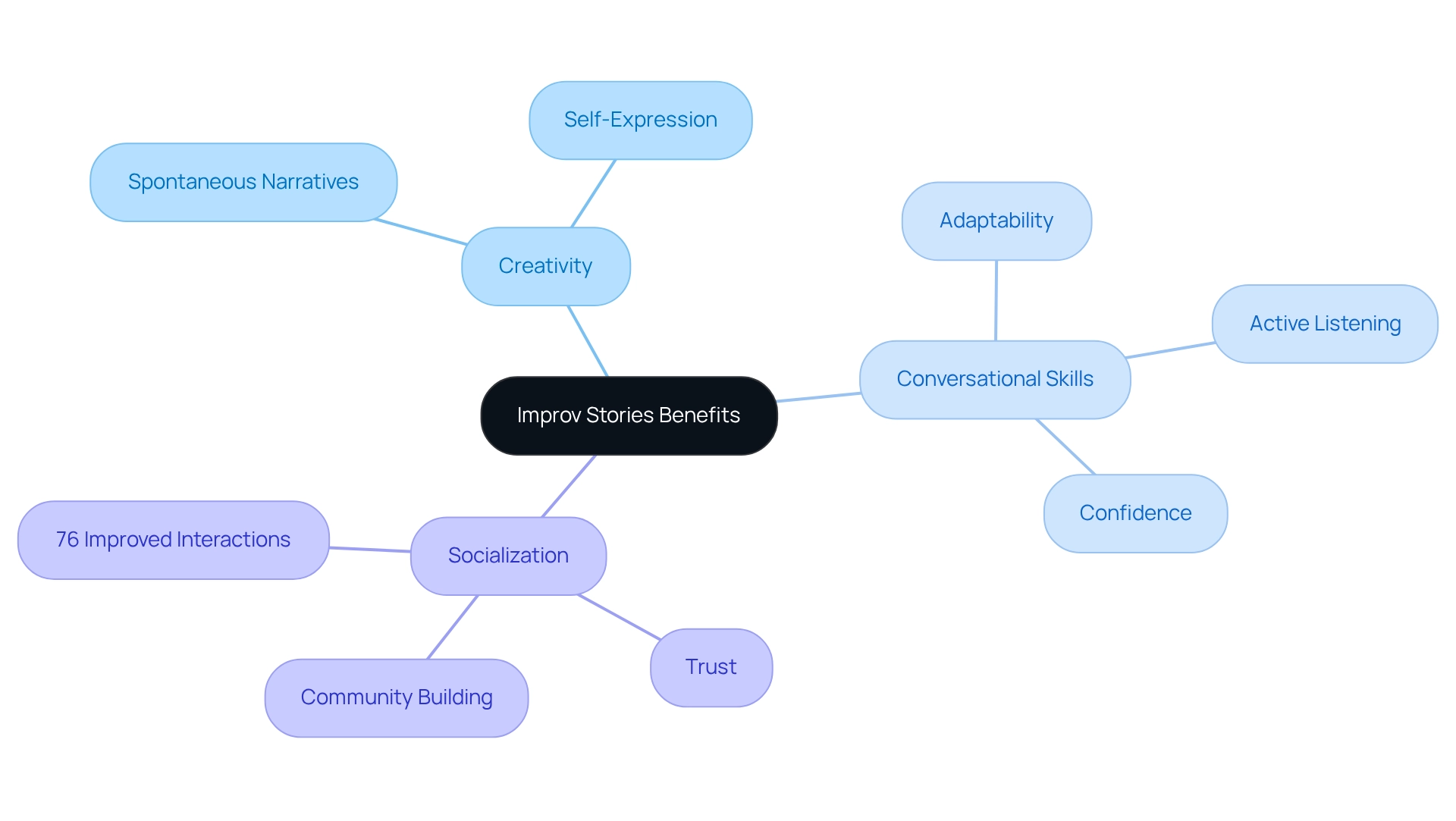
Decision-Making Games: Enhancing Critical Thinking in Social Settings
Decision-making games provide young individuals with relatable scenarios that encourage them to choose among various options, such as 'What would you do if...?' These engaging activities are designed to foster critical thinking and help children understand how their choices affect their interactions with others. By participating in these games, kids not only build confidence in navigating interpersonal situations but also develop the skills necessary for making wise decisions.
Recent research indicates that involvement in decision-making games significantly enhances emotion regulation, which is essential for developing interpersonal skills. Case studies further highlight the effectiveness of these games in educational settings, showcasing their potential to inspire young minds and facilitate practical knowledge application. However, it's crucial to acknowledge that while video games can enhance learning by making it enjoyable, excessive gaming may lead to negative behaviors, including addiction and attention issues. Incorporating decision-making scenarios into social skills activities for autism can create a vibrant learning atmosphere that promotes critical thinking and interpersonal competence, ultimately leading to more successful interactions in daily life. To maximize the benefits of these games, a collaborative approach involving educators, parents, and policymakers can ensure they are implemented effectively to support youth development. Together, we can nurture a generation equipped with the skills to thrive in their relationships and communities.
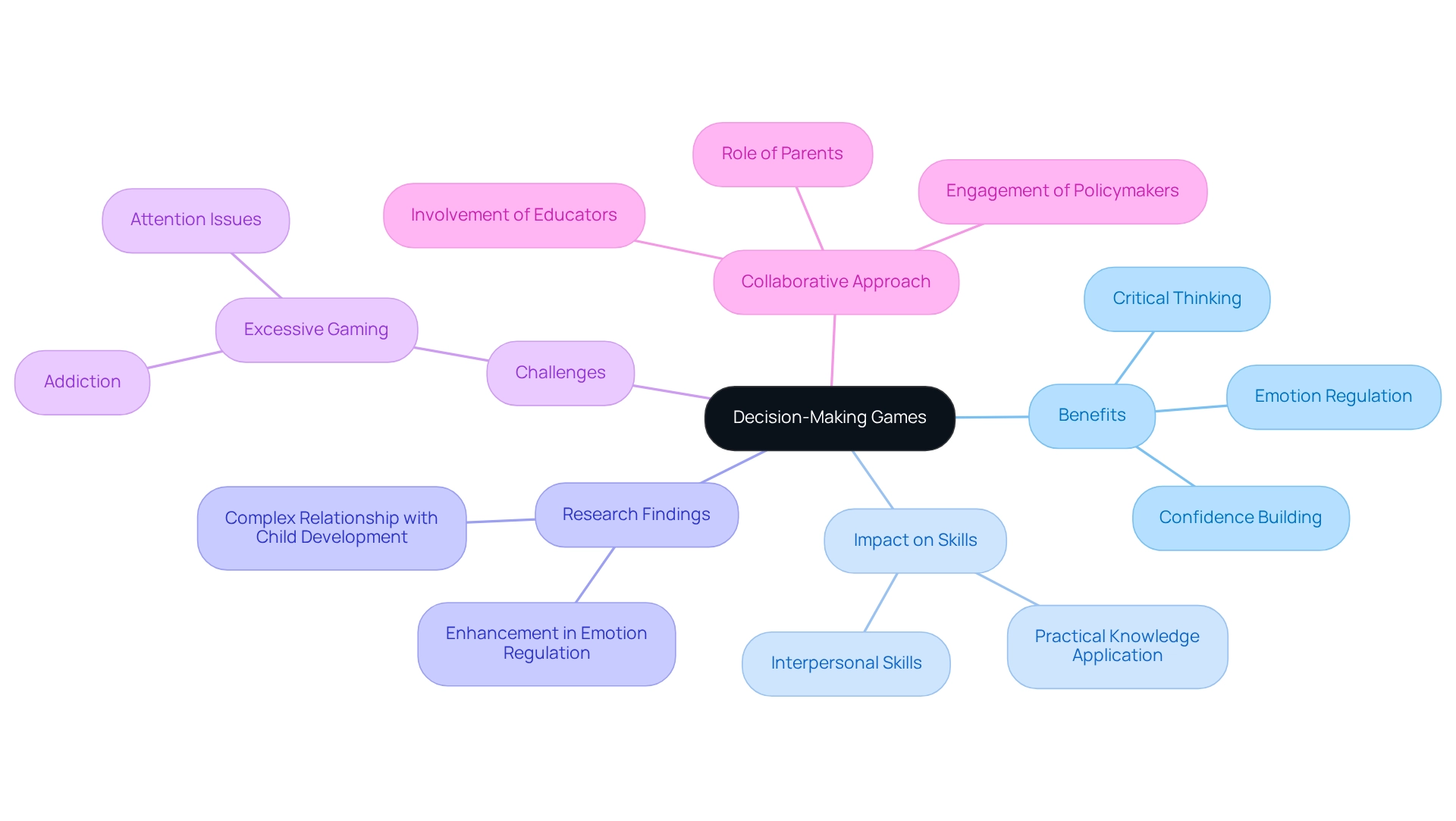
Social Skills Apps: Utilizing Technology for Interactive Learning
Social skills activities for autism serve as vibrant platforms that empower young individuals to practice and enhance their social abilities through interactive learning. These applications often include games, quizzes, and scenarios that replicate real-life interactions, allowing children to engage in a fun and supportive environment. By harnessing the power of technology, young learners can progress at their own pace and receive timely feedback, significantly enriching their learning experience.
Notable applications like 'Proloquo2Go' and 'Choiceworks' are specifically designed to bolster communication and interpersonal skills, making them invaluable resources in the developmental journey of children. Recent research, including the BITs-SST studies involving 138 participants and interventions lasting from 8 to 12 weeks, indicates that social skills activities for autism, such as these technology-assisted programs, have shown promising results in enhancing interpersonal abilities among children with autism. A meta-analysis revealed considerable variability in effect sizes across different studies, with a heterogeneity statistic of 59.14 (p < 0.01), underscoring the potential of tailored technological solutions in fostering the development of interpersonal skills. Furthermore, as highlighted by Luis C. Soles-Núñez, 'the use of a video game significantly enhanced interpersonal abilities,' providing credible support for the effectiveness of interactive applications.
Additionally, the Individualized Social Stories Intervention case study presents another effective strategy for improving interpersonal skills, offering a broader perspective on interventions available alongside these applications. The SRS-2's internal consistency, ranging from 0.94 to 0.96, reinforces the reliability of assessments related to social skills development, adding depth to the conversation on measuring outcomes. This comprehensive overview lays the groundwork for more effective practices in autism treatment, inviting parents to explore these resources for their children’s growth.
Conclusion
Innovative strategies for enhancing social skills in children with autism offer a compassionate approach to addressing their unique challenges. Consider community gardening, which fosters teamwork and social interaction, or engaging games like Emotion Charades that help develop emotional recognition. Each method plays a significant role in skill-building. Role-playing scenarios and social stories empower children by simulating real-life interactions and simplifying complex social cues, respectively. Activities like Hula Hoop Boundaries teach personal space awareness, creating a supportive learning environment.
The integration of technology through social skills apps represents a modern and effective avenue for interactive learning. These applications not only provide children with a safe space to practice but also offer immediate feedback, enhancing their developmental journey. Across various studies, evidence consistently underscores the importance of community support and tailored interventions in fostering social competence and confidence among young learners.
Ultimately, the collective impact of these diverse strategies highlights the critical role of creativity, collaboration, and contextual learning in social skills development for children with autism. By embracing these innovative approaches, caregivers and educators can create a nurturing environment that empowers children to thrive socially. This paves the way for meaningful interactions and a sense of belonging in their communities. The ongoing commitment to exploring and implementing these methods will continue to foster growth and connection for children on the autism spectrum.
Frequently Asked Questions
What is the mission of ASD Media?
ASD Media is dedicated to enhancing the implementation of ABA therapy by empowering parents and professionals to unlock the potential of youth with autism and ADHD through valuable insights, strategies, and community support.
How does ASD Media support social skills development for children with autism?
ASD Media fosters a community where individuals can share experiences and learn from one another, particularly focusing on social skills activities that significantly impact the lives of children on the autism spectrum.
What role does early intervention play in communication skills development?
Research indicates that early intervention, such as introducing augmentative and alternative communication by 12 months, greatly enhances communication skills, which are essential for effective interpersonal development.
What resources does ASD Media provide for parents?
ASD Media offers practical advice for parents, including case studies like 'A Beginner's Guide to Autism Potty Training Success,' which provides strategies for navigating developmental milestones.
What is the significance of Emotion Charades in autism therapy?
Emotion Charades is a game that helps children express and recognize emotions through acting, significantly boosting emotional recognition skills and nurturing empathy and social awareness.
What evidence supports the effectiveness of games like Emotion Charades?
Recent research, including a study by Huang in 2023, shows that games like Emotion Charades can lead to remarkable improvements in emotional recognition abilities among children with autism.
How do board games contribute to social skills development in children with autism?
Board games foster interaction and require players to wait for their turn, encouraging meaningful conversations and enhancing interpersonal skills, which are vital for social growth.
What have studies shown about the impact of board games on children's cognitive and interpersonal skills?
Studies indicate that board games can significantly support the development of interpersonal skills and address challenges in Executive Functioning, promoting collaboration and patience among children.
How can parents incorporate these activities into their child's routine?
Parents are encouraged to consider incorporating board games and interactive games like Emotion Charades into their child's routine to support social development and create joyful moments together.




